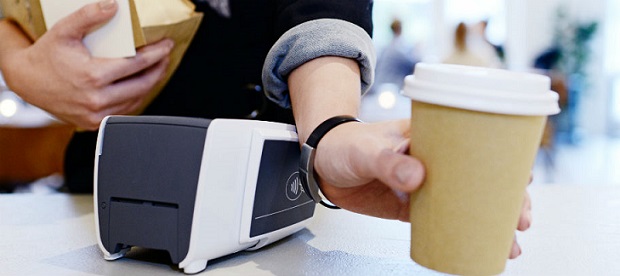
One quarter (24%) of Europeans expect to start using “tap and go” contactless payments with a smartwatch, bracelet, keyring or other forms of wearable payments, according to new figures from Mastercard.
Contactless spend on Mastercard and Maestro grew by 145% in the last year, and the huge success of contactless has seen many Europeans willing to explore new ways to pay. The figures come as The Netherlands embarks on a wearable payments trial for leading Dutch bank ABN AMRO. Alongside this continued growth, barriers to using contactless have also decreased. Concerns around fraud see the greatest decrease (-24%), with the Netherlands (-41%), Spain (-33%) and the UK (-31%) seeing the biggest drop in fraud concerns across local markets, building trust in Mastercard contactless technology.
Banks across Europe are also working with Mastercard to deliver this new wave in contactless payments. ABN AMRO is one of the first banks to enable worldwide payments with a wearable that’s linked to a current account, with a pilot for 500 customers of different age groups, who will be experiencing what it’s like to make contactless payments with a ring, watch, bracelet or keyring. (A video showcase of this pilot launch can be accessed here.)
“Europe leads the world in contactless payments and its overwhelming success has created a demand for even greater convenience,” said Paolo Battiston, Executive Vice President Digital Payments & Labs Europe at Mastercard. “Shoppers trust in contactless is greater than ever, and in turn it seems they are ready to take this one stage further by trying contactless through connected devices. Pilots like the one we’re involved with in The Netherlands will empower consumers in the digital economy.”
Mastercard continues to work with retailers to help meet expectations surrounding wearable payments, with 42% growth in the number of retail locations accepting contactless across Europe. As a result, 38% of all in-store transactions are contactless. The Netherlands provides the perfect test bed for wearable payments because 80% of terminals in the country already accept contactless payments. More than 50% of payments in the Netherlands are also made with contactless according to ABN AMRO.
“With customer expectations clear and the new technology available today, the time has come to drop cumbersome methods of payment and embrace a better consumer experience through wearable payments,” said Yvonne Duits, Product Owner Payments at ABN AMRO. “We care about making things convenient for consumers and offering everyone a payment method that suits their preferences and this pilot is testament to that.”
This follows a recent Mastercard announcement revealing an initiative to create greater payment consistency by making contactless payments a global standard in the next five years.
All data included from Mastercard and Maestro as well as a study conducted of 50,747 people by GCT Research, Inc within the countries: UK, France, Russia, Spain, Italy, Germany, Netherlands, Poland and Sweden.
The current population of Europe is 742,440,228 as of Monday, February 19, 2018, based on the latest United Nations estimates.
Banking 4.0 – „how was the experience for you”
„To be honest I think that Sinaia, your conference, is much better then Davos.”
Many more interesting quotes in the video below: